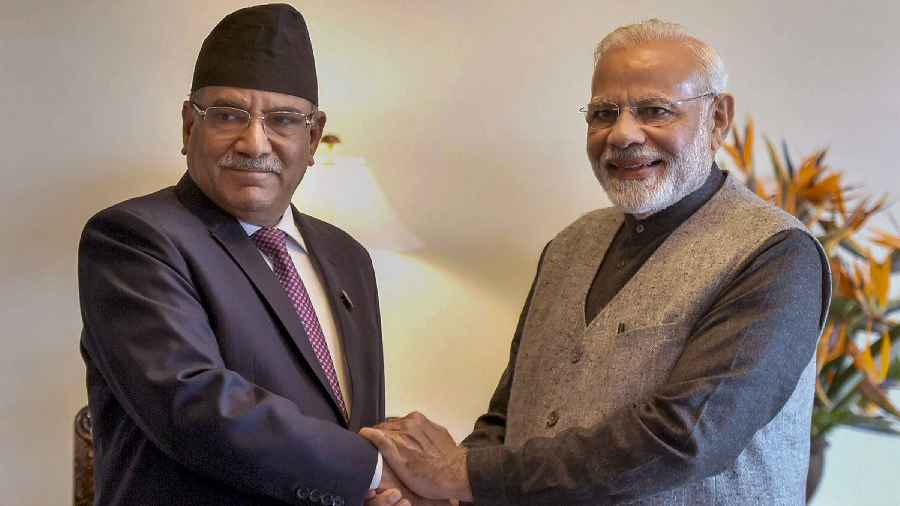India will have to carefully monitor the developments in Nepal and focus on taking forward the overall ties, foreign policy experts said on Monday amid concerns over possibility of China gaining upper hand in Kathmandu under the country's new government led by former Maoist leader Pushpa Kamal Dahal 'Prachanda'.
Prachanda became Nepal's prime minister for a third time after leaving his previous coalition to join hands with former Prime Minister K P Oli-led Communist Party of Nepal-Unified Marxist Leninist (CPN-UML) and five other smaller parties.
Former Nepalese Foreign Minister Ramesh Nath Pandey observed that the current situation is not encouraging for India-Nepal ties, saying the "present leaders" created irritants in the relationship in the past.
"Past records of present leaders are not encouraging. They created new irritants in the relationship and instead of getting away with unwanted baggage, they added more irritants," he told PTI over phone from Kathmandu.
CPN-UML leader Oli is widely seen as a pro-China leader and ties between India and Nepal came under some strain when he was the prime minister between February 2018 and July 2021.
"It is certainly an unexpected development as the Nepali Congress-led five-party coalition could not arrive at a consensus on who would be the prime minister first," said Ranjit Rae, India's former ambassador to Nepal and author of 'Kathmandu Dilemma, Resetting India Nepal Ties'.
"India will have to monitor the developments carefully as China has been trying to unite various factions of Communist parties in the region. We have to keep an eye on it," he told PTI.
Rae, who served as the Indian envoy in Kathmandu between September 2013 to February 2017, said Prachanda is aware of the importance of the ties between India and Nepal.
"At the same time, I would like to say that we have worked with Prachanda during his earlier two stints as the prime minister. He has recently visited India at the invitation of BJP President J P Nadda. He is aware of the importance of the ties between India and Nepal," he said.
"So we must keep on focusing on taking forward the overall ties including in areas of energy security and connectivity. We have made tremendous progress in enhancing cooperation in energy security and trade and I expect it to continue to expand," Rae said.
The former ambassador, who played a key role in enhancing India-Nepal ties during his stint in Nepal, said, "There has been a huge political churn going on in Nepal and new urban-oriented youthful political forces are coming up. We must reach out to them." "Though the ties came under some tension under Oli's prime ministership (border row), both sides came together to defuse it," he said.
On Nepal's trade ties with China, Rae said Kathmandu is aware of the situation faced by Sri Lanka on borrowings from Neijing for the BRI projects. "Let's see how the new government approaches this," he said.
China has been making consistent efforts to expand its influence over Nepal.
Nepal is important for India in the context of its overall strategic interests in the region, and the leaders of the two countries have often noted the age-old "Roti Beti" relationship.
The country shares a border of over 1,850 km with five Indian states – Sikkim, West Bengal, Bihar, Uttar Pradesh and Uttarakhand.
Land-locked Nepal relies heavily on India for the transportation of goods and services.
Nepal's access to the sea is through India, and it imports a predominant proportion of its requirements from and through India.
The India-Nepal Treaty of Peace and Friendship of 1950 forms the bedrock of the special relations between the two countries.
During his visit to India in July, Prachanda said India and Nepal should address diplomatically some of the issues "left by history" to realise the full potential of the bilateral cooperation.
He particularly highlighted the need to resolve matters relating to the 1950 India-Nepal friendship treaty, boundary issue and the EPG (Eminent Persons Group) report.
The EPG was constituted a few years back to look into various aspects of India-Nepal ties including to look at the 1950 friendship treaty between the two countries. Nepal has been demanding a review of the treaty.
Ties between the two countries came under severe strain after Kathmandu published a new political map in 2020 that showed the three Indian territories - Limpiyadhura, Kalapani and Lipulekh - as part of Nepal.
India reacted sharply, calling it a "unilateral act" and cautioned Kathmandu that such "artificial enlargement" of territorial claims will not be acceptable to it.











